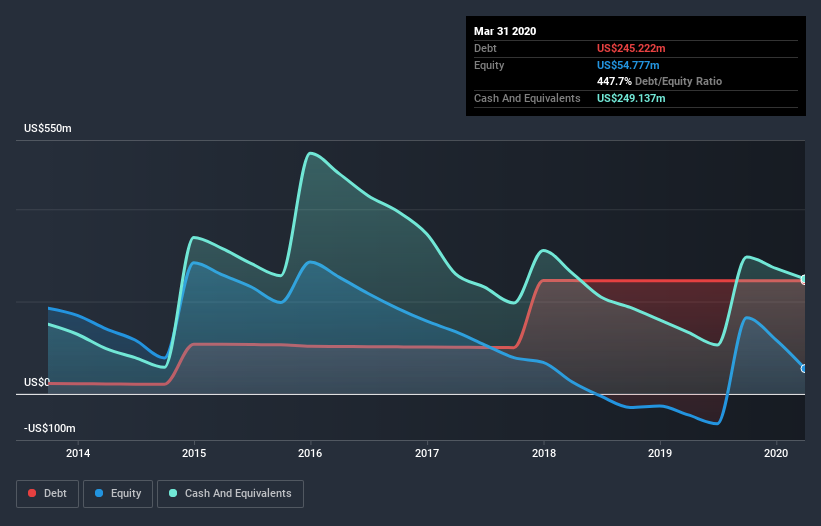Is Lexicon Pharmaceuticals (NASDAQ:LXRX) A Risky Investment?

Legendary fund manager Li Lu (who Charlie Munger backed) once said, 'The biggest investment risk is not the volatility of prices, but whether you will suffer a permanent loss of capital.' So it might be obvious that you need to consider debt, when you think about how risky any given stock is, because too much debt can sink a company. We can see that Lexicon Pharmaceuticals, Inc. (NASDAQ:LXRX) does use debt in its business. But should shareholders be worried about its use of debt?
What Risk Does Debt Bring?
Debt is a tool to help businesses grow, but if a business is incapable of paying off its lenders, then it exists at their mercy. Ultimately, if the company can't fulfill its legal obligations to repay debt, shareholders could walk away with nothing. However, a more frequent (but still costly) occurrence is where a company must issue shares at bargain-basement prices, permanently diluting shareholders, just to shore up its balance sheet. Of course, plenty of companies use debt to fund growth, without any negative consequences. The first thing to do when considering how much debt a business uses is to look at its cash and debt together.
See our latest analysis for Lexicon Pharmaceuticals
What Is Lexicon Pharmaceuticals's Net Debt?
The chart below, which you can click on for greater detail, shows that Lexicon Pharmaceuticals had US$244.7m in debt in March 2020; about the same as the year before. But it also has US$249.1m in cash to offset that, meaning it has US$4.47m net cash.
How Healthy Is Lexicon Pharmaceuticals's Balance Sheet?
The latest balance sheet data shows that Lexicon Pharmaceuticals had liabilities of US$80.3m due within a year, and liabilities of US$235.5m falling due after that. Offsetting this, it had US$249.1m in cash and US$30.1m in receivables that were due within 12 months. So its liabilities total US$36.5m more than the combination of its cash and short-term receivables.
Of course, Lexicon Pharmaceuticals has a market capitalization of US$186.1m, so these liabilities are probably manageable. Having said that, it's clear that we should continue to monitor its balance sheet, lest it change for the worse. While it does have liabilities worth noting, Lexicon Pharmaceuticals also has more cash than debt, so we're pretty confident it can manage its debt safely.
Although Lexicon Pharmaceuticals made a loss at the EBIT level, last year, it was also good to see that it generated US$125m in EBIT over the last twelve months. When analysing debt levels, the balance sheet is the obvious place to start. But it is future earnings, more than anything, that will determine Lexicon Pharmaceuticals's ability to maintain a healthy balance sheet going forward. So if you're focused on the future you can check out this free report showing analyst profit forecasts.
Finally, while the tax-man may adore accounting profits, lenders only accept cold hard cash. While Lexicon Pharmaceuticals has net cash on its balance sheet, it's still worth taking a look at its ability to convert earnings before interest and tax (EBIT) to free cash flow, to help us understand how quickly it is building (or eroding) that cash balance. During the last year, Lexicon Pharmaceuticals generated free cash flow amounting to a very robust 94% of its EBIT, more than we'd expect. That positions it well to pay down debt if desirable to do so.
Summing up
While Lexicon Pharmaceuticals does have more liabilities than liquid assets, it also has net cash of US$4.47m. The cherry on top was that in converted 94% of that EBIT to free cash flow, bringing in US$117m. So we are not troubled with Lexicon Pharmaceuticals's debt use. The balance sheet is clearly the area to focus on when you are analysing debt. However, not all investment risk resides within the balance sheet - far from it. Case in point: We've spotted 3 warning signs for Lexicon Pharmaceuticals you should be aware of.
If you're interested in investing in businesses that can grow profits without the burden of debt, then check out this free list of growing businesses that have net cash on the balance sheet.
This article by Simply Wall St is general in nature. It does not constitute a recommendation to buy or sell any stock, and does not take account of your objectives, or your financial situation. We aim to bring you long-term focused analysis driven by fundamental data. Note that our analysis may not factor in the latest price-sensitive company announcements or qualitative material. Simply Wall St has no position in any stocks mentioned.
Have feedback on this article? Concerned about the content? Get in touch with us directly. Alternatively, email editorial-team@simplywallst.com.

